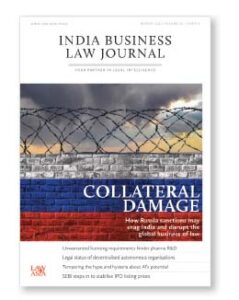There are no winners from war
The Ukraine-Russia conflict has compelled nations to walk a diplomatic tightrope. While many have waited and watched in order to craft a measured response, others went swiftly down the economic sanctions route, with even Switzerland joining in the sanctioning of Russia. The Swiss government said it hasn’t abandoned its long-held position of neutrality, as it isn’t supplying weapons or troops.
This month’s Cover story analyses the Russia-Ukraine conflict from the point of view of the legal community. As we detail, there has been an exodus of international law firms from Moscow even as sanctions have begun to bite and many firms have been forced to also close their offices in Ukraine.

India Business Law Journal
The speed with which Russian banks and businesses have been frozen out of the international system will have surprised many law firms and lawyers who had built up practices in Russia in the past couple of decades.
Closer to home, Singapore announced sanctions and Asia-Pacific law firms that work with Russian companies or do transactions involving companies with links to Russia are likely to be affected. Despite India’s decision to abstain from voting against Russia in the UN, law firms may find themselves sucked into the turmoil prompted by a backlash against the Russian economy.
The sanctions could also be a cause for concern for India, given Russia’s importance as a military and economic partner, and as a supplier of oil. For the vast number of Indians who have been working and studying in Ukraine and are now fleeing the country, it is an ongoing tragedy.
In Overstepping the mark we turn the spotlight on the so-called test licences that companies proposing to manufacture drugs typically obtain in their hundreds each year for R&D purposes. As we detail, while companies are required to obtain these licences by rules framed under the Drugs and Cosmetics Act, this requirement is both outside the scope of the act and inconsistent with its provisions.
While the act regulates the import, manufacture, distribution and sale of drugs and cosmetics, it does not cover scenarios where the manufacturing is carried out for R&D purposes. As such, the requirement for test licences is an example of subordinate legislation overriding the provisions of the statute. This is not ideal and also hinders R&D activities with regard to drug development in India.
Writing in this month’s Vantage point Abhivardhan and Mridutpal Bhattacharyya – of the Indic Pacific Legal Research and Indian Society of Artificial Intelligence and Law, respectively – suggest that discussions about the opportunities and threats of AI need to be tempered to avoid knee-jerk reactions from regulators and other stakeholders.
They write that the hype around AI is primarily due to the marketing and promotion of AI technology and AI-based technology by self-interested investors, and its promotion as a sure-fire be all and end all for issues that plague humanity. Neither of these aid wise policymaking, which will need a deeper understanding of the intrinsic potential of disruptive technologies and of sector-specific developments prompted by disruptive technologies.
In this month’s The briefing we consider efforts by the Securities and Exchange Board of India (SEBI) to tighten the framework for IPOs following a bumper year for them in India. Companies such as the digital payments giant Paytm, which had its IPO in 2021, currently trade below their offer price, and the SEBI has stepped in with a lengthier lock-in period for anchor investors.
This was not unexpected, and to know if it does make a difference market watchers need wait only until the much-anticipated mega-IPO by Life Insurance Corporation of India that is expected soon.
This month’s Intelligence report examines the legal status of decentralised autonomous organisations (DAOs), which have emerged with the rise of blockchain technology. DAOs, where trust in humans is replaced with trust in technology, may well shape the future, just as the conferring of legal personality on companies in the 19th century enabled companies to operate independently and to be accountable to shareholders, third parties and the broader community.
The moot point now is whether human agents can be replaced with reliable and “neutral” computer code, and if decision-making can similarly be “democratised” such that shareholders participate in all decisions concerning the company or, alternatively, agree to the basis on which decisions should be made autonomously by computer code? Such questions, which were previously theoretical in nature and considered to be the stuff of fiction, are now being answered in the affirmative with the emergence of DAOs.



























